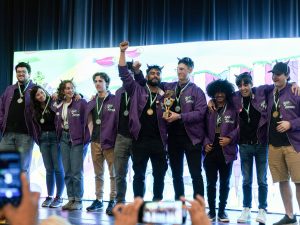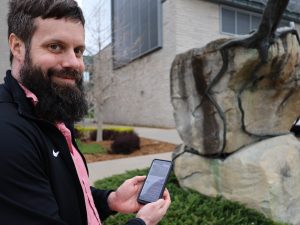 Assistant Professor of Mathematics and Statistics William Marshall is conducting Canada Games-related research.
Assistant Professor of Mathematics and Statistics William Marshall is conducting Canada Games-related research.NOTE: This is the latest in a series of question and answer stories featuring Brock University faculty members who are integrating the 2021 Canada Games into their research projects. For more information on Brock’s academic activities around the Games, visit brocku.ca/canada-games
William Marshall, Assistant Professor of Mathematics and Statistics in the Faculty of Mathematics and Science, researches computational statistics with applications to neuroscience in three main categories: casual networks, measures of connectivity and Linear Mixed Effect (LME) Models. He is one of 11 Brock researchers and scholars to have received funding under the 2019-20 round of the VPR Canada Games Grant program.
Here, he discusses the research he’s conducting, titled “Using Data Science to Predict Golfer Performance.”
Please give a brief overview of your research project.
“Sports analytics is the use of statistics to gain a competitive advantage. In the age of big data, the field of sports analytics is becoming increasingly interdisciplinary, combining domain specific knowledge from sports management with data science. Data science is the use of statistical and computational tools to extract knowledge and insights from data.
Golf is a sport that generates massive amounts of data with no shortage of opportunity for analysis. However, there are few analyses available outside of the PGA Tour. Our proposed research project will use data science to predict the outcome of the golf competition at the 2021 Canada Games.”
What do you expect will be the outcome of your research?
“The main objective of the project is to create a statistical model for predicting golfer performance. With this model, we will predict the outcome of golf tournaments, both for the 2021 Canada Games and on the PGA Tour.
A secondary objective is to identify the factors that are most important for predicting golfer performance. Identifying the variables that most impact performance will help trainers to create individualized development plans for athletes to focus on the areas that will have the greatest benefit.”
How will this contribute to knowledge, or understanding of, the Canada Summer Games?
“The ability to predict the performance of an athlete can help to ensure that top players are selected to represent each province at the 2021 Canada Games and that the top Canadian golfers are selected to represent Canada on the international stage.
How did you become interested in this research?
“The VPR Canada Games Grant project is an extension of an Honours Project with Brad Klassen, a student in the co-op stream of our Statistics program here at Brock (now enrolled in our master’s program). In the project, Brad developed a statistical model for predicting golfer performance on the PGA Tour.
The VPR Canada Games Grant provides an excellent opportunity to further develop our model using more sophisticated data science methods and to use an expanded data set (Canadian Tour and Canada Games golf statistics) to improve predictions.”
How do you plan on sharing your research?
“The data for our project has been posted on Kaggle, a popular data science website. The dataset has been very popular with over 50,000 views, 8,600 downloads and 25 posted analyses, even reaching the number one spot as the “hottest” dataset for numerous weeks. Its online presence has allowed many people to share their unique analyses and draw insights and conclusion from the data.
We will continue to update the dataset, including data acquired from Golf Canada. Posting the dataset online for public use will create awareness for Canadian golfers, the Canadian Tour and the 2021 Canadian Summer Games, and perhaps encourage people to make their own predictions for the Games.”
Do you have any advice or tips on how colleagues in your Faculty can incorporate the Canada Games into their research?
“Data Science is an interdisciplinary endeavour. Our project, “Using Data Science to Predict Golfer Performance,” combines mathematics and statistics with domain-specific knowledge from sports management specifically relating to golf. In tailoring these methods to a specific problem, I find that it can help stimulate new mathematical or statistical ideas.
I would recommend that my colleagues in Mathematics and Statistics seek out collaborations with other disciplines. For the Canada Games specifically, I think there are many opportunities with sports management, health sciences, or business and economics.”









